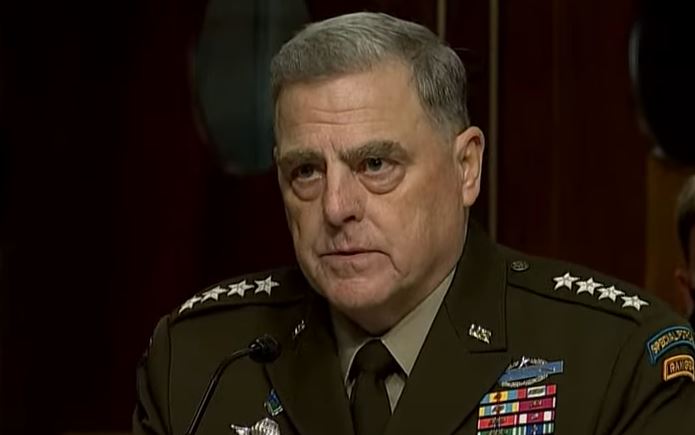
By Philip Wegmann for RealClearMarkets
The Biden administration never expected congressional oversight to be comfortable, but even as lawmakers were busy grilling top military brass Tuesday about their handling of the chaotic withdrawal from Afghanistan, Jen Psaki said the hearing was necessary and good.
“We feel this is a part of democracy,” the press secretary explained from the White House podium. After all, she continued, President Biden “welcomes the candor” and “welcomes the debate.” That candor is a reflection of his leadership, “and that’s the kind of president that he will continue to be.”
All the same, this hearing was particularly problematic for the president. Just hours before Psaki embraced the oversight, Joint Chiefs of Staff Chairman Gen. Mark Milley and the head of U.S. Central Command, Gen. Frank McKenzie, told the Senate Armed Services Committee that they had recommended keeping at least 2,500 U.S. troops in Afghanistan to prevent the country from collapsing.
The obvious problem: Biden had gone on the record in August saying he never got that advice.
The president told ABC News’ George Stephanopoulos that his military advisers did not recommend leaving a residual force, insisting that “no one said that to me, that I can recall.”
Now, the White House says a closer reading of the transcript shows Biden was referring to “a split” between generals who argued a residual force was necessary and those who said it was not. “So, what should everybody take from that?” Psaki asked reporters, setting up the answer to her own question. “There was a range of viewpoints.”
RELATED: Psaki Confronted About Reports Biden Ignored Military Advice To Keep Troops In Afghanistan
Milley and McKenzie, as their testimony made clear Tuesday, were on the losing side of that argument. Who were the military commanders who won the debate? For now, that remains a mystery.
When pressed by a reporter from ABC for that information, Psaki refused to name names. “The president made clear that the advice was split. He didn’t outline what every individual conveyed to him in private,” she replied, adding that Pentagon officials were “testifying before Congress today. They’re answering questions accurately. They’re providing more detail on their advice, as they should.”
She added that “these conversations don’t happen in black and white or like you’re in the middle of a movie.” Biden is presented with “a range of options about what the risk assessments are about every decision.”
The response was not well received in some corners of Capitol Hill. “Accountability isn’t possible when the White House won’t provide basic information,” complained a senior congressional aide after Milley and McKenzie wrapped up their testimony. “If we’re going to get to the bottom of what went wrong here, the White House needs to come clean about who was in Biden’s ear.”
Sen. Elizabeth Warren apparently did not see a contradiction. After questioning the military leaders at the hearing, the Massachusetts Democrat tweeted her two takeaways: “ 1) Leaving a few thousand US troops would not have changed the outcome — but would have resulted in more Americans dying. 2) President Biden followed military advice on the withdrawal and evacuation.”
RELATED: General Mark Milley Defends Secret Calls To China In Grilling Before Congress
While Defense Secretary Lloyd Austin told the committee that leaving a residual force would lead to a fight with the Taliban — a statement White House aides rushed to promote on social media Tuesday evening — he and the other Pentagon officials who testified declined to discuss specific conversations with the president.
Biden came into office promising to be a straight shooter with the American public. He was barely president two weeks when he issued a memorandum announcing “as much transparency as possible regarding the work of our national security institutions, consistent with legitimate needs to protect sources and methods and sensitive foreign relationships.”
Throughout the withdrawal, even after the country fell to the Taliban, Biden repeatedly made his thinking clear in speeches and press conferences. He refused to continue the war by sending troops “lurching into the third decade of conflict.” And as the fourth president to preside over the conflict, he promised not to “pass this responsibility on to a fifth.”
Now that the last U.S. soldiers have left Afghanistan, why won’t the White House reveal which generals were on either side of “the split” regarding the need for a residual force? Doesn’t the public deserve to know who was advising Biden during that final chapter of history?
RELATED: Marine Who Criticized Military’s Afghanistan Withdrawal Has Reportedly Been Jailed
“What the American public can know and understand is that the president will welcome and take and ask for and push for a range of opinions on every national security decision that he makes,” Psaki said in answer to a question from RealClearPolitics. She reiterated, however, that “we are not going to detail those private discussions, private decisions that happen in the situation room, for the public.”
Syndicated with permission from RealClearWire.
